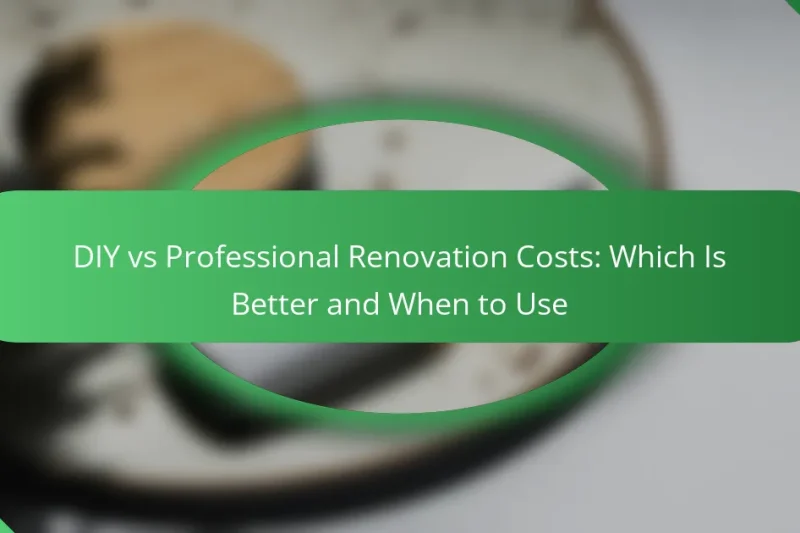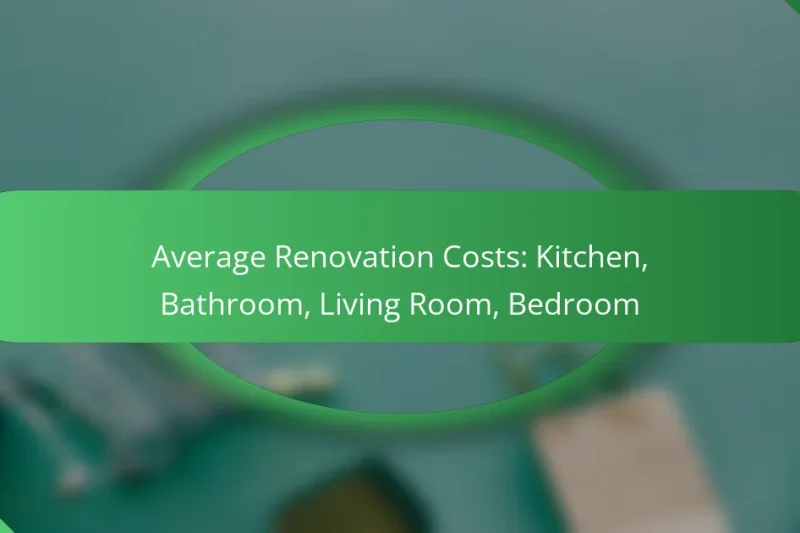Understanding the return on investment (ROI) for home renovations is crucial for homeowners looking to enhance … Return on Investment for Home Renovations: Metrics, Trends and AnalysisRead more
Home Renovation Cost Factors
Home renovation costs can vary widely based on several key factors, including labor, materials, design fees, and location. By understanding these elements, homeowners can create a realistic budget and make informed decisions throughout their renovation journey. Common projects like kitchen remodels and bathroom renovations often have fluctuating costs influenced by the scope of work and local market conditions.
Bathroom Renovation Hidden Costs: Permits, Materials and Labor
When planning a bathroom renovation, it’s crucial to account for hidden costs that can quickly add … Bathroom Renovation Hidden Costs: Permits, Materials and LaborRead more
Cost-Saving Tips: Older Homes, Materials and Labor
Renovating older homes can be a cost-effective endeavor when homeowners focus on energy efficiency and smart … Cost-Saving Tips: Older Homes, Materials and LaborRead more
DIY vs Professional Renovation Costs: Which Is Better and When to Use
When deciding between DIY and professional renovations, homeowners must weigh the costs and benefits of each … DIY vs Professional Renovation Costs: Which Is Better and When to UseRead more
Kitchen Remodel Budgeting: Strategies, Costs and Savings
Budgeting for a kitchen remodel in Canada requires careful planning and prioritization to ensure that homeowners … Kitchen Remodel Budgeting: Strategies, Costs and SavingsRead more
Average Renovation Costs: Kitchen, Bathroom, Living Room, Bedroom
Renovating your home can be a significant investment, with average costs varying widely based on the … Average Renovation Costs: Kitchen, Bathroom, Living Room, BedroomRead more
Home Renovation Financing Options: Loans, Grants and Credit
When considering home renovations, understanding your financing options is crucial for making informed decisions. In Canada, … Home Renovation Financing Options: Loans, Grants and CreditRead more
What are the main cost factors for home renovation in Canada?
The main cost factors for home renovation in Canada include labor costs, material expenses, design fees, permits and inspections, and location-specific costs. Understanding these elements can help homeowners budget effectively and make informed decisions throughout the renovation process.
Labor costs
Labor costs typically account for a significant portion of the total renovation budget, often ranging from 20% to 50%. Skilled tradespeople, such as electricians and plumbers, may charge higher rates due to their expertise, while general contractors may offer package deals that include multiple services.
When planning your renovation, consider obtaining multiple quotes from contractors to ensure competitive pricing. Always check references and verify credentials to avoid potential pitfalls with unqualified workers.
Material expenses
Material expenses can vary widely based on the quality and type of materials selected. Basic materials may be more affordable, while high-end options can significantly increase costs. For example, choosing granite countertops over laminate can add hundreds to thousands of dollars to your budget.
To manage material costs effectively, create a detailed list of required items and research prices from various suppliers. Look for sales or discounts, and consider using reclaimed materials for a more budget-friendly option.
Design fees
Design fees can range from a few hundred to several thousand dollars, depending on the complexity of the project and the designer’s experience. Hiring a professional designer can help optimize space and enhance aesthetics, but it’s essential to weigh these costs against the potential benefits.
To minimize design fees, consider using online design tools or consulting with a designer for a limited scope of work. This approach can provide valuable insights without incurring full-service fees.
Permits and inspections
Permits and inspections are often required for major renovations, especially those involving structural changes or electrical work. Costs for permits can vary by municipality, typically ranging from a few hundred to over a thousand dollars.
Before starting your renovation, check local regulations to determine what permits are needed. Failing to obtain the necessary permits can lead to fines or complications when selling your home.
Location-specific costs
Location-specific costs can significantly impact renovation budgets, as labor and material prices vary across Canada. Urban areas like Toronto and Vancouver may have higher costs due to demand, while rural regions might offer more affordable options.
When budgeting for a renovation, consider the local market conditions and adjust your expectations accordingly. Engaging with local contractors can provide insights into regional pricing trends and help you make informed choices.
How can I estimate my home renovation budget?
Estimating your home renovation budget involves assessing various cost factors, including materials, labor, and project scope. Start by gathering information from reliable sources to create a realistic financial plan.
Use online calculators
Online renovation cost calculators can provide quick estimates based on your project details. These tools typically ask for information like square footage, type of renovation, and location to give you a ballpark figure.
While calculators can be helpful, remember they offer general estimates. Always consider additional costs such as permits, unexpected repairs, or upgrades that may arise during the renovation process.
Consult with contractors
Getting quotes from multiple contractors is essential for a more accurate budget. Contractors can provide insights on material costs, labor rates, and timelines based on their experience with similar projects.
When consulting contractors, ask for detailed estimates that break down costs by category. This will help you understand where your money is going and identify areas where you might save.
Review past project costs
Looking at the costs of similar renovation projects in your area can help you set realistic expectations. Websites that showcase home renovations often include budget breakdowns, which can serve as a valuable reference.
Consider reaching out to friends or family who have recently renovated their homes. Their experiences can provide insights into potential expenses and help you avoid common pitfalls.
What are the most common renovation projects and their costs?
The most common renovation projects include kitchen remodels, bathroom renovations, basement finishing, and roof replacements. Costs for these projects can vary significantly based on factors such as location, materials, and the extent of the work required.
Kitchen remodel
A kitchen remodel typically involves updating appliances, cabinetry, countertops, and flooring. Depending on the scope, costs can range from a few thousand dollars for minor updates to tens of thousands for a complete overhaul.
When planning a kitchen remodel, consider the layout and functionality. Open floor plans are popular, but they may require structural changes that can increase costs. Prioritize high-quality materials for areas that see heavy use, like countertops and flooring.
Bathroom renovation
Bathroom renovations often focus on fixtures, tiles, and cabinetry. Basic updates can start around a few thousand dollars, while full renovations may exceed $20,000, especially for luxury finishes.
To maximize your investment, consider energy-efficient fixtures and durable materials. Pay attention to plumbing and electrical work, as these can significantly impact the overall budget if updates are needed.
Basement finishing
Finishing a basement can transform an underutilized space into a functional area, such as a family room or guest suite. Costs generally range from $10,000 to $50,000, depending on the complexity and design.
Ensure proper insulation and moisture control to prevent future issues. It’s advisable to check local building codes and obtain necessary permits before starting the project to avoid complications.
Roof replacement
Roof replacement is a critical renovation that protects your home from the elements. Costs can vary widely, typically ranging from $5,000 to $15,000, influenced by the type of materials used and the size of the roof.
When replacing a roof, consider options like asphalt shingles, metal roofing, or tiles, each with different lifespans and maintenance needs. Hiring a reputable contractor is essential to ensure quality work and compliance with local regulations.
How do renovation timelines affect costs?
Renovation timelines significantly impact overall costs, as longer projects typically lead to increased expenses. Extended durations can result in higher labor costs, potential material price fluctuations, and additional overheads.
Longer projects increase labor costs
As renovation projects extend, labor costs tend to rise due to the need for ongoing workforce engagement. Contractors often charge daily or weekly rates, which can accumulate quickly over time. For instance, a project that takes a few weeks may cost significantly less than one that stretches into several months.
Additionally, prolonged timelines can lead to increased costs for project management and supervision. Keeping a team on-site longer may also require additional accommodations or benefits, further inflating the budget.
Seasonal pricing variations
Renovation costs can fluctuate based on the season, with peak times often leading to higher prices. For example, spring and summer are popular seasons for home renovations, resulting in increased demand and potentially higher labor rates. Conversely, winter months may offer lower prices due to decreased demand.
Homeowners should consider planning renovations during off-peak seasons to take advantage of lower costs. Additionally, some materials may be cheaper during specific times of the year, so timing your purchases can lead to significant savings.
What financing options are available for home renovations?
Home renovations can be financed through various options, each with its own benefits and drawbacks. Understanding these financing methods can help homeowners choose the best fit for their budget and renovation needs.
Home equity loans
Home equity loans allow homeowners to borrow against the equity they have built up in their property. Typically, these loans offer lower interest rates compared to personal loans because they are secured by the home itself.
When considering a home equity loan, it’s crucial to assess the amount of equity available, which is usually calculated as the difference between the home’s current market value and the outstanding mortgage balance. Homeowners should also be aware that defaulting on this loan could lead to foreclosure.
Personal loans
Personal loans are unsecured loans that can be used for home renovations without requiring collateral. These loans generally have higher interest rates compared to home equity loans, making them a more expensive option over time.
Before opting for a personal loan, homeowners should evaluate their credit score, as this will significantly influence the interest rate offered. It’s advisable to shop around for the best terms and consider fixed-rate loans for predictable monthly payments.






